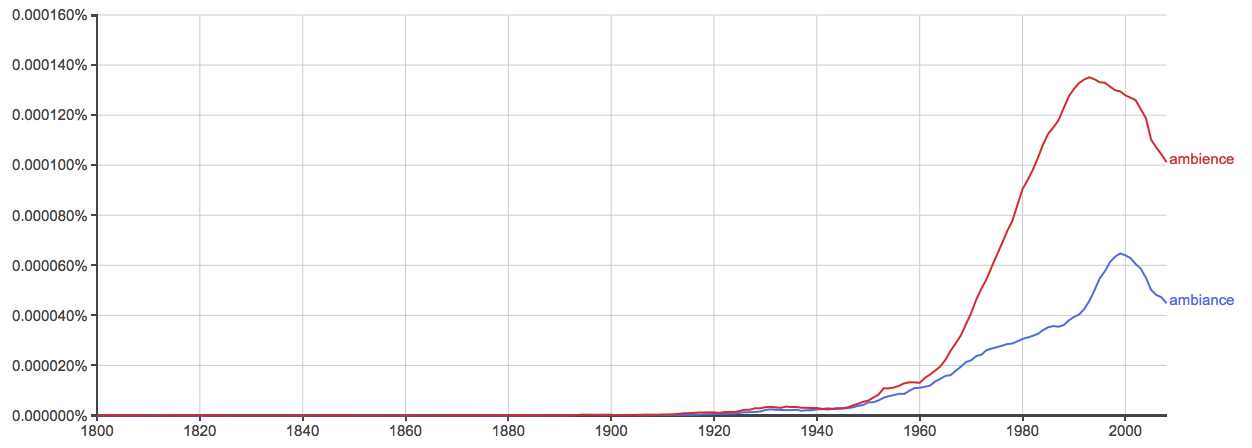Let’s say you are trying to choose a restaurant for an anniversary dinner with your spouse. You will want to select a location that has an environment or atmosphere that you will both enjoy.
You notice that some online reviews use the word ambiance to describe this concept, while others use ambience.
Do these words mean the same thing? What do they say about the restaurants you are considering for your dinner? Continue reading to find out whether you should choose an eatery with good ambiance or ambience.
What is the Difference Between Ambiance and Ambience?
In this article, I will compare ambiance vs. ambience. I will use these spellings in example sentences, so you can see them in the proper context.
I will also tell you a helpful memory trick to help you decide whether to choose ambience or ambiance.
When to Use Ambience
 What does ambience mean? Ambience is a noun. It refers to the general character or atmosphere of a place.
What does ambience mean? Ambience is a noun. It refers to the general character or atmosphere of a place.
For example,
- The low lighting and fireplaces gave the restaurant a pleasant ambience.
- Inn of the Hawke has a pub ambience with a selection of craft beers. –The Wall Street Journal
- Bernal Heights has the ambience of a village, with small shops, public bulletin boards papered over with notices and even a wild coyote whose welfare many in the community fuss over. –The New York Times
Ambience and ambiance both derive from the French word ambiance. Ambience is the Anglicized version that first entered English in 1889, mirroring the adjective ambient, which has been in English since the late 16th century. ¹
Still, to this day, ambience is the preferred spelling in American and British English. Ambience occurs more than twice as often in written English as ambiance.
As you can see from the chart below, ambience is the more common variant.

Ambiance, which more closely resembles the original French word, is generally seen as an affectation in English, a vogue word that often comes with a pretentious pronunciation: Ahm-bee-ahn[t]s.
When to Use Ambiance
What does ambiance mean? Ambiance, when it is spelled as such, has all the same meanings and uses as ambience.
For example,
- The grocery store had all the ambiance of a warehouse.
- Without quiet music, this coffee shop would have little in the way of ambiance.
Ambience or Ambiance? When to Use Each
 Both of these words are nouns, and they share a common meaning. Ambiance is closer to the word’s origins in French, but ambience is more common in actual use and has been in English longer.
Both of these words are nouns, and they share a common meaning. Ambiance is closer to the word’s origins in French, but ambience is more common in actual use and has been in English longer.
Both of these spellings are legitimate, but most editors prefer ambience. Moreover, your audience will be used to seeing the word spelled this way, since ambience is used more frequently. Thus, in addition to finding favor with editors, ambience will seem more natural, and is probably the better choice.
You can remember to choose ambience for your audience since it is spelled with an extra E, the letter that begins editor. Since editors prefer ambience, you can link these words together in your mind.
Summary
Is it ambiance or ambience? Ambiance and ambience are two different spellings of the same word, which denotes atmosphere or mood, especially of a place.
- Neither spelling is incorrect, but ambience is standard in formal writing.
- Ambience is the preferred spelling in English.
By linking the words ambience and editor in your mind, you can remember to use this term in formal contexts.
Any time you need help, you can always check this site for further assistance.
References: 1). Fowler’s Dictionary of Modern English Usage, 2015, p. 43.
Contents
